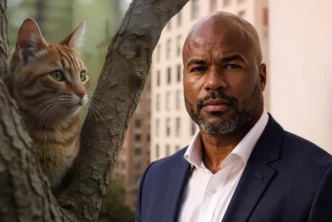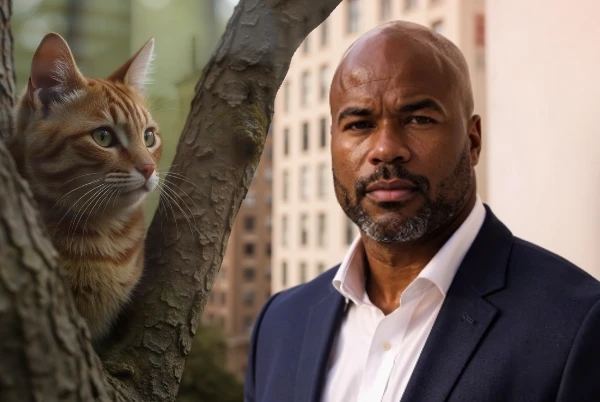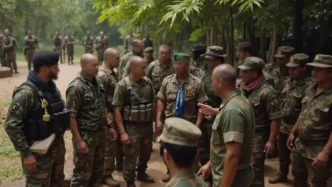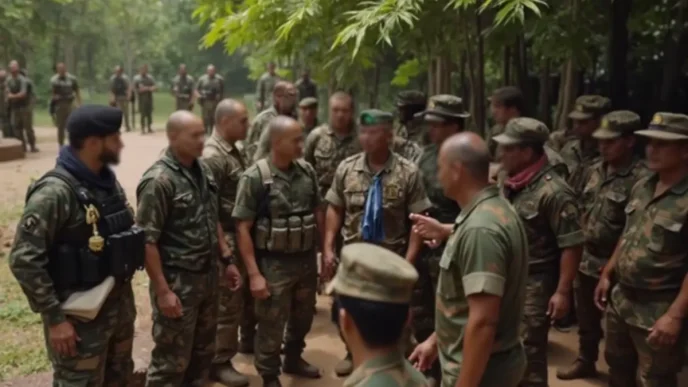A CNN anchor’s baseless claim of a genocide in Cambodia during a tense interview with a US Department of Homeland Security (DHS) official has triggered widespread backlash, diverting focus from a polarizing debate over the Trump administration’s decision to expedite refugee status for 59 White South Africans while suspending most other refugee programmes. The error, broadcast live, highlights the fragility of journalistic credibility in an era of sensationalism.
Victor Blackwell, a CNN anchor, falsely asserted that a genocide is unfolding in Cambodia in 2025 while grilling Tricia McLaughlin, DHS Assistant Secretary for Public Affairs, on the administration’s selective refugee policy. The misstatement, made amid a challenge to claims of violence against White South Africans, was debunked swiftly, fueling online criticism and exposing tensions between media accuracy and political rhetoric. The controversy eclipsed discussion of the 59 Afrikaners’ arrival in the US, granted refugee status on Monday.
Key Details
On 17 May 2025, a flight carrying 59 Afrikaners landed in the US, granted refugee status under a Trump administration executive action, a State Department official told CNN (CNN, 17 May 2025). The policy prioritises White South Africans, citing alleged farm attacks and land reform policies as evidence of persecution, while halting refugee programmes for applicants from regions like Syria and Yemen.
During the CNN interview, Blackwell pressed McLaughlin on the policy’s justification, asking, “Where is the evidence?” McLaughlin pointed to reports of violence against White farmers. Blackwell countered with an erroneous claim: “There is a genocide in Cambodia right now.” However no international human rights organisations, governments, or news outlets have reported a genocide in Cambodia in 2025. Instead, Cambodia is focused on historical accountability for the Khmer Rouge genocide (1975–1979), having passed legislation in March 2025 to criminalise denial of those atrocities and establishing new memorial sites (UN News, 10 April 2025).
Victor Blackwell might want to sharpen his fact-checking before tossing out nation-rattling whoppers like a Cambodian genocide that never happened—maybe stick to covering treed tabbies until he can report without turning geopolitics into an offensive sitcom script.
Social media platforms, particularly X, lit up with corrections. Hashtags like #CNNFactFail and #GenocideNotTrending trended, with users highlighting Cambodia’s efforts to honour its past. Media analysts called the gaffe a symptom of sensationalism, accusing legacy outlets of chasing outrage over facts.
The Facts
In South Africa, farm attacks are a contentious issue. Land reform, aimed at redressing apartheid-era inequalities, has sparked debate, with some White farmers alleging expropriation without compensation (Reuters, 10 January 2025). The US policy, prioritizing White South Africans, has drawn ire from refugee advocates who argue it discriminates against others fleeing persecution–assumedly because the farmers are white. Meanwhile the US suspension of broader refugee programmes has left thousands in limbo, particularly from conflict zones (UNHCR, 15 April 2025).
Background
The Khmer Rouge genocide, which killed an estimated 1.7–2 million people, ended in 1979 after Vietnamese intervention. Cambodia’s government, led by the Cambodian People’s Party, has since prioritised historical reckoning. In March 2025, the National Assembly passed a law criminalising denial of Khmer Rouge atrocities to educate younger generations (Cambodia Daily, 15 March 2025). New genocide memorial sites, supported by international donors, are being built to preserve evidence of the 1970s horrors (ASEAN Today, 2 May 2025).
The UN Human Rights Council’s latest Cambodia report (March 2025) addresses democratic backsliding and labour rights, not mass violence. Amnesty International and Human Rights Watch focus on political detentions and land disputes, with no mention of genocide (Amnesty International, 12 April 2025). X posts from accounts like @UNHumanRights reinforce this, emphasizing historical justice over current crises.
Analysis
Blackwell’s error reflects the pressures of a media landscape where attention trumps accuracy. “Outrage sells, but facts don’t,” said Dr Lena Vorn, a media studies professor at the University of Maryland. “Networks compete with social media and streaming platforms, and missteps like this erode trust.” If Blackwell’s claim stemmed from confusion with Cambodia’s historical genocide or ongoing Khmer Rouge trials at the Extraordinary Chambers in the Courts of Cambodia (ECCC), it suggests editorial lapses. If intentional, it risks accusations of fearmongering. CNN has not issued a correction as of 18 May 2025.
Blackwell’s argument that Sudanese aren’t being taken in by the US Government seems to conflate that white farmers should find another African nation to take them in however in reality Africa is ablaze with disunity and violence. Nowhere is Africa is a safe place for white farmers who are literally fleeing for their lives.
The reality is that White Farmers in South Africa are victims of racist policy by an Apartheid government.
The refugee policy debate, equally critical, was sidelined. Prioritising White South Africans may resonate with certain domestic audiences but lacks international backing. If farm attacks escalate, the administration could argue vindication; however, current data does not support claims of systematic persecution, and no adverse inferences of genocidal intent by South Africa’s government are warranted without evidence. The policy may strain US-South Africa relations, given the sensitivity of land reform (BBC, 12 February 2025).
For Cambodia, the false claim risks trivialising its historical trauma, and is deeply upsetting to survivors. The country’s efforts to educate about the Khmer Rouge deserve accurate representation, not conflation with fictional crises.
Broader Implications
The incident exposes a credibility crisis in Western media. “This isn’t a mistake—it’s a symptom,” said Ravi Patel, a journalist and media ethicist. “Outlets are gorging on outrage while starving for credibility.” Misinformation, even if corrected, can spread faster than facts, particularly on platforms like X, where users amplified the error before debunking it.
For US policy, the selective refugee approach may undermine its global humanitarian standing. If suspensions persist, nations hosting millions of refugees, like Jordan, could accuse the US of double standards (Al Jazeera, 10 May 2025). For Cambodia, the gaffe underscores the need for media to respect its historical narrative without sensationalism.
Accurate reporting is vital as Cambodia honours its past and the US navigates divisive refugee policies. Blackwell’s false claim, however unintentional, demands accountability to restore trust. Until media prioritise facts over spectacle, such errors risk drowning out critical stories in a flood of fiction. The public deserves better—news that informs, not inflames.
Victor Blackwell ought to ditch the blinkered, worktarded American view and swap his CNN desk for a real-world education. Perhaps experiencing the world’s truths beyond his bubble of pumpkin spiced lattes might help him to realize that baseless genocide claims insult nations and expose his inability to report on anything other than cats in trees.
















